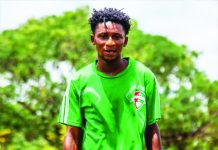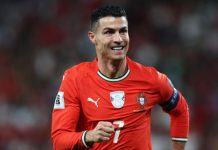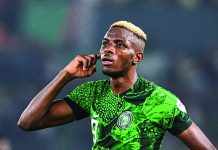The Africa Cup of Nations kicks off in Cameroon on Sunday, as the biggest names in African football assemble to compete for the continent’s grandest prize.
While the tournament build-up has been overshadowed by conflicts with European clubs, the coronavirus pandemic, security concerns in the host nation and questions about stadium readiness, the talent is there for the football to truly do the talking.
Indeed, this may be one of the finest arrays of continental footballing talent set to compete for the Nations Cup in some years, with Champions League winners, Premier League winners, Ballon d’Or contenders all hoping to lift the trophy on February 6.

Of the world football superstars set to still be standing come the business end of the marathon tournament, Riyad Mahrez appears best placed to bring home the gold.
Algeria are reigning champions, of course, and while age is not on their side, they’ve only gone from strength to strength since winning the title in Egypt in 2019.
Indeed, they haven’t lost a match since defeating Senegal in that final, and are currently enjoying a world record undefeated streak that stretches all the way back to late 2018.
After recent victory in the Arab Cup, confidence is high, and not only do this side have winning in their DNA, but they’ve also refreshed their options under Djamel Belmadi.
Islam Slimani, now the country’s all-time top scorer, will compete with 2019 hero Baghdad Bounedjah to lead the line, and the likes of Youcef Belaili, Ismael Bennacer, Said Benrahma, Yacine Brahimi and Sofiane Feghouli will provide ample support.
There are some ageing legs in there—Slimani, Bounedjah, Mahrez, Brahimi and Feghouli are all the wrong side of 30—but a squad of 28 gives them space to reshuffle and rest key options.
It will be interesting to see how Algeria react if they’re truly up against it, or if their undefeated streak ends in the group stage, but it will take a fine side indeed to deny them a second continental crown.
Behind them, Senegal appear the next strongest side in the competition, even if positive Covid tests for KalidouKoulibaly and Edouard Mendy on the eve of the tournament threaten to disrupt their group-stage campaign.
With Sadio Mane constantly pressing and probing, they didn’t have too much trouble progressing through their various qualifiers in 2020 and 2021. Indeed, this side haven’t lost a full competitive international since that loss against Algeria in the 2019 final.
They are a consistent and united bunch under AliouCisse, with experience of nearly going the distance and impressing—briefly—at the 2018 World Cup under their belt.
A maiden title for the nation feels like the logical next step, although the fact they have one of the all-time dominant national teams in Algeria standing in their way represents a hefty obstacle.
After the top two, the field becomes a little less clear, with sides in West, North and Central Africa all sure to quietly be fancying their chances of emerging victorious.
Morocco deserve immense credit for regenerating themselves as a force to be reckoned with under Vahid Halilhodzic, having come so close to greatness under his predecessor Herve Renard.
A lot of the same qualities—including an immense professionalism—still remain, although the coach’s decision to leave NoussairMazraoui, Amine Harit and—of course—Hakim Ziyech out of the group may yet come back to haunt them.
In the likes of Ayoub El Kaabi, Ryan Mmaee and the returning Youssef En-Nesyri, the experienced Halilhodzic will feel he has enough firepower to go deep into the competition, while the thrust of Achraf Hakimi from full-back could be a decisive weapon.
Cameroon will also be targeting the semi-finals at least, as they look to respond to an increasing fervour on home soil as the tournament looks set to commence.
While the Indomitable Lions haven’t exactly been in the doldrums in recent years, they still haven’t truly discovered the lustre that was lost with that horror showing at the 2014 World Cup, with the sense that their unlikely 2017 Nations Cup triumph came in spite of the squad’s limitations.
The Clarence Seedorf experiment didn’t work, and while Toni Conceicao has proved to be a staid replacement, his side’s World Cup showdown triumph over the Ivory Coast may be the launchpad this side need to truly express themselves.
Buoyed by a wave of patriot passion, they could go the distance—seven of this squad have experience of winning the whole thing—although the weight of public expectation could yet weigh heavy on their shoulders.
Ivory Coast, eliminated from the World Cup by the Lions, will be licking their wounds as they head to Cameroon, and that defeat shouldn’t entirely take away from the good work achieved under Patrice Beaumelle.
The likes of Eric Bailly and Serge Aurier are experienced—even if they don’t always show it—and have won the title before, while Franck Kessie is one of Africa’s elite midfielders.
If he and Jean Seri can ensure control, then a rich attacking roster—including Wilfried Zaha—could prove too much for most of Africa’s defences.
The absence of goalkeeper Sylvain Gbohouo, banned after taking a prohibited substance, is an unwanted setback.
Egypt and Nigeria, who meet in their opening group game, are continental giants who look like they’re a rung or two beneath the aforementioned sides heading into this one.
With Mohamed Salah, the Pharaohs will be contenders, although they’re at a very early stage of their development under Carlos Queiroz, while Nigeria only have themselves to blame for a haphazard tournament preparation.
Gernot Rohr was dispatched after the final World Cup qualifier, and while the decision may have been the right one, the timing was questionable at best. Subsequently, the appointment of Jose Peseiro—set to be present at the tournament as an overseer—suggests a lack of ambition, while a wave of squad withdrawals have dampened expectations.
Odion Ighalo, Victor Osimhen, Emmanuel Dennis, Paul Onuachu, TeremMoffi, CyrielDessers, Abdullahi Shehu and Ademola Lookman are all absent for varying reasons, and Nigeria have gone from having more attacking options than they can fit in one squad to not exactly knowing where the goals will come from.
If the likely forward pairing of Taiwo Awoniyi and Kelechi Iheanacho can click, however, they could yet be strong contenders.
Ghana, like Egypt, are at an early stage of their development, but the return of coach Milovan Rajevac—who oversaw the Black Stars’ run to the World Cup quarter-finals in 2010—should see the establishment of a strong team identity.
They haven’t convinced in recent years, but if Thomas Partey can pull the strings, and the Ayew brothers can bring their experience to bear, then Ghana shouldn’t be discounted as dark horses.
It’s a similar story for Tunisia, who, as ever, will not be subdued easily.
As far as darker horses go, Gabon’s Pierre-Emerick Aubameyang should have a point to prove, and the Panthers could make an impact in neighbouring Cameroon if the chronic disorganisation that constantly accompanies this team can be overcome.
Mali and Guinea should make the knockouts, but also keep an eye on Burkina Faso, who should get out of their group and who have proved—in 2013 and 2017—that they’re not adverse to upsetting the odds in a knockout environment.
None of the teams are no-hopers, even Comoros, The Gambia, Equatorial Guinea, Malawi and Sierra Leone have pulled out some big results over the last 18 months, and don’t be surprised to see one or two shock results a la Madagascar’s victory over the Super Eagles in 2019.
Credit: goal.com









